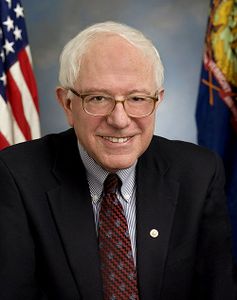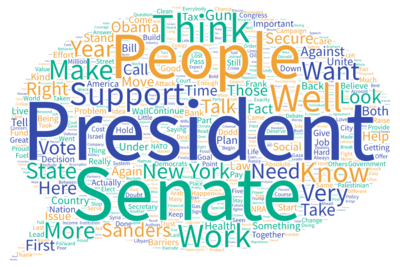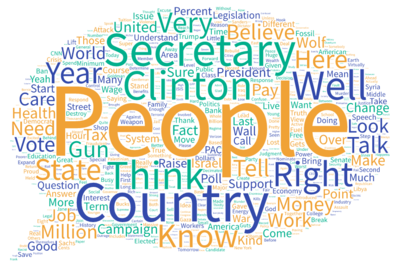CNN Brooklyn, New York, Democratic debate (April 14, 2016)
![]() Ballotpedia's scope changes periodically, and this article type is no longer actively created or maintained. If you would like to help our coverage grow, consider donating to Ballotpedia.
Ballotpedia's scope changes periodically, and this article type is no longer actively created or maintained. If you would like to help our coverage grow, consider donating to Ballotpedia.
This article focuses exclusively on the ninth Democratic debate hosted by CNN and NY1 News on April 14, 2016. Click here to access Ballotpedia's full 2015-2016 presidential debate coverage. A schedule for Democratic primary debates can be found below.
The ninth Democratic debate took place on April 14, 2016, just five days before the Democratic primary election in New York and nine days after the Wisconsin primary election, which Bernie Sanders won by 13 points. The debate was announced on April 4, following weeks of negotiations between the campaigns of Hillary Clinton and Bernie Sanders over the date and venue of a ninth debate. Prior to the April 14 event, the last debate between Clinton and Sanders was on March 9, 2016, in Miami, Florida. Ballotpedia's coverage of the ninth Democratic debate includes an overview of the event's basic information, an Insiders Poll, and statistics.
Basic Information
Date: April 14, 2016
Time: 9:00 EST
Location: Brooklyn, New York
Venue: Brooklyn Navy Yard
Sponsors: CNN and NY1 News
Moderators: Wolf Blitzer, Dana Bash and Errol Louis[1]
Participants
Insiders Poll
Democrats Brawl in Brooklyn
April 15, 2016
By James A. Barnes
With less than a week to go before the pivotal New York Democratic presidential primary, former Secretary of State Hillary Clinton and Vermont Sen. Bernie Sanders battled in a CNN-hosted debate in what was their most testy one-on-one encounter of the campaign. Both threw punches, but in a survey of more than 90 Democratic and Republican political insiders, 70 percent of the Democrats said that Clinton was the biggest winner of the debate.
Among the 63 Democratic Insiders—party strategists, pollsters, media consultants, activists, lobbyists and allied interest group operatives—who responded to the survey, several of Clinton’s fans judged that she handled the pressure of the moment better than Sanders. “She looked confident, cool, presidential and very righteous—one of her best nights thus far,” said one Democratic Insider. “By contrast, Sanders looked like a beet—red-faced. He was flat-footed and cranky.” Another echoed that Clinton was “presidential, not like the Bernie, swinging for the home run at each pitch that came in from the questioner.” And a third said, “Hillary was cool, calm, collected, and presidential. Bernie played to the audience on the hall, while Hillary played to the folks at home.”
Clinton was also seen as having the upper hand on more issues that are likely to resonate with New York’s Democratic primary voters when they go to polls on April 19. “Big win for Clinton on guns, foreign policy, Israel, and supporting Obama, especially on SCOTUS,” maintained one Democratic influential. Another declared that Clinton, “nailed every significant point particularly Sanders’ vote against Brady bill!”
To be sure, even some who thought Clinton prevailed felt that the tone of the evening at times overshadowed both of the Democratic debaters. “They both lost in the yelling of the first half; HRC won in second half and with foreign policy,” averred one Democratic Insider. This survey was conducted anonymously to encourage candor from the Insiders.
And given Clinton’s commanding delegate lead in Democratic nominating contest, Sanders needs to score decisively in encounters like this to shake up the basic dynamics of the race. “Bernie fired up his people who were already fired up; he didn’t change anyone else’s mind,” said one Democratic Insider. “As long as the race remains constant, it is a Hillary win.”
Instead, several Democratic Insiders thought that Sanders did not shine in the Brooklyn slugfest. “Bernie was shouting, saying the same thing over and over: Hard to listen to him,” said one Democrat. Added another, “I have always been open to the Bern, but he is starting to seem condescending and cranky.”
But some saw Sanders more as a tenacious truth-teller. “He was tough, smart and courageous,” said one Democratic Insider who judged Sanders as the biggest winner of the night. “Never before saw a candidate stand firm on Palestinians. He’s got guts and the support of the base.” Another noted, “He’s the principled one, while she’s the pragmatist.”
And among those who saw the debate as a draw; that works to the advantage of a frontrunner like Clinton. “Both candidates had their moments: Sanders on the minimum wage, Clinton on guns,” said one Democratic Insider. “On balance though it was fairly even. While there was no big winner, a draw is all Clinton needed as she is leading and only needed to avoid a loss.” Another Democrat echoed, “With no clear winner, Clinton maintains a huge lead and wins. Bernie made his points, but failed to offer new and compelling arguments for his candidacy.”
Republican Insiders, whose presidential nominating contest has been even more contentious than the Democratic race, thought that Sanders got the better of Clinton. Among the relatively small number who watched the Democratic debate, 28, almost half said that the Vermont Senator was the biggest winner from the Brooklyn face-off.
Sanders “sounded like a true liberal which is what Democrats are desiring this cycle,” observed one GOP Insider. “It's undeniable that Hillary was eager to be on the offense in this debate, but the mere fact that in mid-April Sanders is still a factor makes him a winner,” asserted another. “Hillary tries to lecture, badger and deny,” maintained a Republican Insider. “Bernie speaks to everyday folks.”
But Clinton’s command of policy and the debate stage did not go unnoticed by other Republicans. “There is no question that Clinton is better informed, more prepared and clearly more presidential than Sanders,” opined one GOP Insider. “It is hard to imagine Sanders as commander-in-chief. Clinton sounds like she can do the job. Sanders sounds like the cranky critic that he is.” Another Republican noted, “She didn’t give an inch. Looked tough in a Commander-in-Chief way.” And third Republican offered Clinton this backhanded compliment: “Despite her protests of being held to a double standard, she once again got away with sarcasm and snide comments that would have been widely criticized if uttered by a male.”
James A. Barnes is a senior writer for Ballotpedia and co-author of the 2016 edition of the Almanac of American Politics. He has conducted elite opinion surveys for National Journal, CNN and the on-line polling firm, YouGov. This Insiders survey was conducted April 14-15.
Statistics
This article analyzes the central themes of the ninth Democratic presidential debate held on April 14, 2016, in Brooklyn, New York. The transcripts prepared by The Washington Post and CNN were used to measure candidate participation and audience engagement.[2][3] Footage from the debate was consulted where there were ambiguities in the text.
To compare the statistics of this debate to those of the previous Democratic debate, see the analysis of the Univison debate held on March 9, 2016.
Segments
Including opening and closing statements, this debate featured 20 unique discussion segments covering campaign finance, domestic policy, and foreign relations. These discussion segments were measured by any shift in the theme of a discussion prompted by one of the moderators: Wolf Blitzer, Dana Bash, and Errol Louis.
- Opening statements
- Candidates' qualifications and judgment
- Wall Street and banking policy
- Influence of contributions from Wall Street on Clinton's economic policy
- Disclosure of Clinton's private speeches to Goldman Sachs and Sanders' tax returns
- Corporate regulation and job creation
- Minimum wage
- Gun control and liability for gun manufacturers and sellers
- Violent Crime Control and Law Enforcement Act of 1994 and criminal justice reform
- Climate change policy and campaign contributions from the fossil fuel industry
- Fracking and energy production
- Regime change in Libya
- North Atlantic Treaty Organization (NATO)
- Israeli-Palestinian conflict
- Cost of Sanders' education and healthcare programs
- Social Security and the taxable income cap
- Nomination of Merrick Garland to the U.S. Supreme Court
- Sanders' commitment to the Democratic Party
- Delegates and potential contested nominating convention
- Closing statements
Participants
Overall participation
Participation in a discussion segment was defined as a substantive comment related to the discussion segment's topic. Jokes and attempts to gain permission from a moderator to speak were not considered participatory speech acts. In some instances, candidates who participated in a discussion segment diverted from the prompted topic.
Clinton and Sanders participated in every discussion segment.
Candidate participation by speaking order
This study also calculated the number of times a candidate spoke first or second during a discussion segment, whether prompted by a moderator with a question or invitation to rebut or by interjection.
For the first time in a Democratic presidential debate, Clinton and Sanders were called on to participate in every discussion segment and were prompted to speak first an equal number of times.
Audience engagement
Audience engagement was measured by noting applause, cheering, or laughter in The Washington Post's transcript. Footage from the debate was consulted when the text was ambiguous about to whom the audience was responding.
For the seventh consecutive debate, Sanders received the most positive reactions from the audience, registering 81 instances. The discussion segments on the candidates' qualifications and judgment, climate change policy, and the Israeli-Palestinian conflict produced the most live audience engagement overall.
The moderators also received cheers at several points for challenging the candidates—by, for example, calling on Sanders to provide one instance of where Clinton's policy was influenced by contributions from Wall Street and asking Clinton to explain why she had not released the transcripts of the speeches she gave to Goldman Sachs.
Candidate analysis
|
|
Democratic Debate Schedule
Click the schedule to return back to the top of the page.
See also
- Presidential debates (2015-2016)
- Presidential candidates, 2016
- Presidential election, 2016/Polls
- 2016 presidential candidate ratings and scorecards
- Presidential election, 2016/Straw polls
Footnotes










